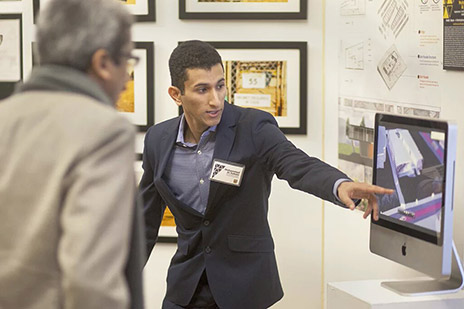Published on Sept. 1, 2016

Junior architectural studies major Mohammed Al Subaie’s childhood in the city of Jeddah, Saudi Arabia revolved around family and soccer. An interest in art and design developed in middle school, but it was not until he came to the United States that he chose to pursue architecture as a possible career.
“The architecture where I grew up is unique because of its historic building designs and materials,” Al Subaie says. “Architecture in Saudi Arabia was historically dictated by the climate, geography and resources available. Today, architecture in Saudi Arabia is looking carefully at these concepts, and trying to apply them in a more contemporary way.”
Al Subaie enjoys architecture because it requires creativity and problem solving at the same time.
“I am interested in the relationship between architecture and technology,” Al Subaie says. “I would like to pursue the research experimentation side of architecture and be able to experiment the possibilities of how technology is changing the discipline of architecture.”
Al Subaie came to MU to study English, but changed his major to architectural studies during his freshman year. He dreams of creating affordable housing for people of all socioeconomic backgrounds. That idea was sparked in an architecture class when he was challenged with a theoretical proposal to design a sustainable and affordable house for a low-income family in Columbia.
“The need for sustainable and affordable housing is a worldwide issue,” he says.
Al Subaie’s cousin is a Mizzou alumnus and recommended the university. Al Subaie ultimately chose MU based on research he did on Columbia’s strong college-town atmosphere. His first trip to the U.S. did not come until he made the move to Columbia.
“I have always wanted to study in the U.S. because I knew it would give me the best opportunity to get the best education,” Al Subaie says.
Students in Saudi Arabia do not usually get to work with professors on an individual basis. That is an aspect of his education Al Subaie has come to love at MU. Students in the U.S. also have more access to tools such as laser cutters and 3D printers and more opportunities to participate in events such as MU’s Undergraduate Visual Art & Design Showcase, at which he received one of three $250 awards of merit for his theoretical design for a new makerspace located where MU’s campus meets downtown Columbia.
Al Subaie’s faculty mentor Bimal Balakrishnan says the challenge came in merging the architectural styles of the two locations.
“You need to know about basic spatial design and take into account the needs for having technological pieces such as ventilation,” Balakrishnan says. “[Al Subaie] is logical; his forms reflect the functions inside of the building. To do things at that level of design, building and construction, and having such strong computational skills is unique.”
Balakrishnan says Al Subaie’s drive sets him apart from other students.
“Mohammed wants to make the most out of every opportunity here,” Balakrishnan says. “He is also very humble; he is a pretty talented student, but you’ll never see him gloat after winning a prize. He is always looking for ways to improve.”